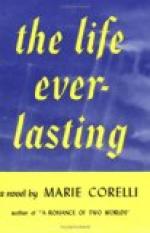“Not half enough!” said Catherine Harland, quite suddenly—she had scarcely spoken before, but she now leaned forward, looking eagerly interested—“You speak of power over yourself,—do you possess the same power over others?”
“Not unless they come into my own circle of action,” he answered. “It would not be worth my while to exert any influence on persons who are, and ever must be, indifferent to me. I can, of course, defend myself against enemies—and that without lifting a hand.”
Everyone, save myself, looked at him inquisitively,—but he did not explain his meaning. He went on very quietly with his own personal narrative.
“As I have told you,” he said—“I came out of my studies with Aselzion successfully enough to feel justified in going on with my work alone. I took up my residence in Egypt in my father’s old home--a pretty place enough with wide pleasure grounds planted thickly with palm trees and richly filled with flowers,—and here I undertook the mastery and comprehension of the most difficult subject ever propounded for learning—the most evasive, complex, yet exact piece of mathematics ever set out for solving—Myself! Myself was my puzzle! How to unite myself with Nature so thoroughly as to insinuate myself into her secrets,—possess all she could offer me,- -and yet detach myself from Self so completely as to be ready to sacrifice all I had gained at a moment’s notice should that moment come.”
“You are paradoxical,” said Mr. Harland, irritably. “What’s the use of gaining anything if it is to be lost at a moment’s bidding?”
“It is the only way to hold and keep whatever there is to win,” answered Santoris, calmly—“And the paradox is no greater than that of ‘He that loveth his life shall lose it.’ The only ‘moment’ of supreme self-surrender is Love—when that comes everything else must go. Love alone can compass life, perfect it, complete it and carry it on to eternal happiness. But please bear in mind that I am speaking of real Love,—not mere physical attraction. The two things are as different as light from darkness.”
“Is your curious conception or ideal of love the reason, why you have never married?” asked Brayle, abruptly.
“Precisely!” replied Santoris. “It is most unquestionably and emphatically the reason why I have never married.”
There was a pause. I saw Catherine glancing at him with a strange furtiveness in which there was something of fear.
“You have never met your ideal, I suppose?” she asked, with a faint smile.
“Oh yes, I’ve met her!” he answered—“Ages ago! On many occasions I have met her;—sometimes she has estranged herself from me,— sometimes she has been torn from me by others—and still more often I have, through my own folly and obstinacy, separated myself from her—but our mutual mistakes do no more than delay the inevitable union at last.”—Here he spoke slowly and with marked meaning—“For it is an inevitable union!—as inevitable as that of two electrons which, after spinning in space for certain periods of time, rush together at last and remain so indissolubly united that nothing can ever separate them.”




